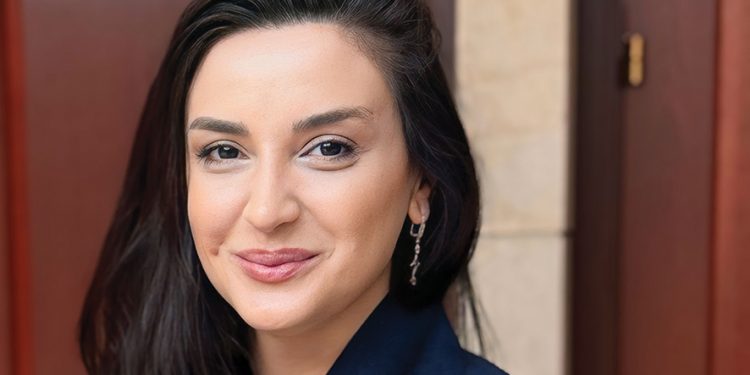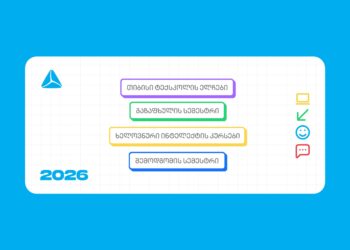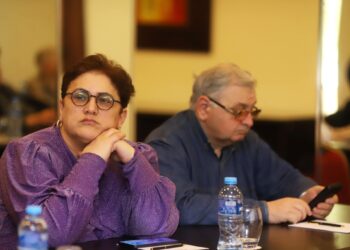Over the years, Tamar Makharashvili, an Inclusive Tourism, Universal Design, and Accessibility Audit Expert, PhD candidate, has dedicated herself to advocating for equal opportunities within the tourism industry, both in her home country of Georgia, and internationally. As the founder of the NGOs Inclusive Tourism Center (ITCP) and the International Institute of Universal Design Research and Education (IIUDRE), she has pioneered efforts to break down barriers for persons with disabilities and integrate inclusivity into the tourism sector in Georgia. In this interview, she shares her journey, achievements, and future aspirations.
“My journey advocating for equal opportunities in tourism began over a decade ago with the establishment of the NGO – Inclusive Tourism Center (ITCP) in Georgia,” she tells us. “Recognizing the substantial challenges faced by persons with disabilities in accessing tourism facilities, I initiated educational programs, conducted extensive research, piloted accessibility projects, and launched advocacy campaigns aimed at fostering inclusivity in the tourism sector. Tourism is pivotal for Georgia’s economic growth, contributing to revenue generation, job creation, and cultural exchange. By nurturing an inclusive tourism market, Georgia can attract a diverse range of visitors, including those with disabilities, thereby boosting tourism revenues and promoting social inclusion. Ensuring human rights in tourism entails eliminating barriers and providing accommodations to ensure equitable access to travel and leisure activities for all.”
How has support from international experts influenced your work?
The support from international experts has been invaluable. I am grateful to the European Network for Accessible Tourism (ENAT) and its experts, Ivor Ambrose, Katerina Papamichail, and Chris Veitch, whose guidance has been instrumental in introducing international standards for inclusive tourism and accessibility. Their expertise has also been pivotal in developing educational programs and integrating inclusive tourism into Georgian legislation.
Can you elaborate on your role with the The Global Initiative for Inclusive Information and Communication Technologies (G3ict)?
In 2022, I had the honor of joining The Global Initiative for Inclusive Information and Communication Technologies (G3ict), as a Country Advisor/Expert on Inclusive Tourism. This role allows me to leverage my expertise in developing international training programs and educational resources on Inclusive Tourism. These initiatives are poised to equip global tourism professionals with the requisite knowledge and skills to create more inclusive and accessible tourism experiences. G3ict – the Global Initiative for Inclusive Information and Communication Technologies – is an advocacy initiative launched in December 2006 by the United Nations Global Alliance for ICT and Development, in cooperation with the Secretariat for the Convention on the Rights of Persons with Disabilities at UN DESA. The mission of G3ict is to build a global community to advance the fundamental human right of persons with disabilities to digital access. The organization supports countries in developing and implementing inclusive ICT policies, providing guidelines, resources, and expertise. G3ict conducts research, publishes reports, and offers certification programs and trainings to empower organizations in creating accessible ICT solutions. By collaborating with global entities and promoting international standards, G3ict advocates for a more inclusive digital environment.
Your contributions have been recognized with prestigious awards. Can you tell us more about these achievements?
I am honored to have received several esteemed awards recognizing my contributions to inclusive tourism. These accolades include The Best Woman Entrepreneur in Tourism Industry Award and The Best Specialized Tourism Services Award for ITCP at the Welcome to Georgia National Tourism Awards. These awards underscore the impact of our efforts in promoting inclusive tourism and highlight the strides made in this field.
You’ve authored and co-authored several significant publications and piloted educational video tutorials. Can you highlight some of these works?
One of my key publications is Inclusive Cities-Urban Area Guidelines, which represents comprehensive research and collaborative efforts within the framework of the Asian Development Bank’s project. This book marks the first comprehensive attempt in Georgia to formulate inclusive urban planning strategies tailored to the country’s unique context. Additionally, I have developed guidebooks such as Development of Inclusive Tourism, Universal Design, and National Accessibility Standards, along with other publications that integrate universal design principles into Georgia’s tourism sector and raise awareness about inclusive tourism.
The innovative educational video tutorials I created, supported by the Department of Tourism and Resorts of the Ajara Autonomous Republic and other stakeholders, have been instrumental in equipping tourism professionals with the necessary knowledge and skills to promote inclusivity and accessibility in the tourism industry. These tutorials provide practical guidance and insights on inclusive tourism practices, empowering tourism professionals to enhance accessibility and inclusivity in their respective destinations and services.
What are the primary goals of ITCP, and could you highlight key accessibility projects in historical sites?
ITCP is dedicated to advancing inclusive tourism that benefit all stakeholders. Our primary commitment is to advocate for the rights of persons with disabilities through legislative and policy advocacy. By adhering to international standards and implementing strategic initiatives, we aim to foster an environment that promotes heightened accessibility, inclusivity, and equitable opportunities across the tourism sector, in line with global standards and conventions. I have had the privilege of leading accessibility projects for several historical monuments and cultural buildings. Notably, in the historic city of Mtskheta, which is immensely important both locally and globally. My expertise and leadership were pivotal in promoting accessibility for four historical monuments: Svetitskhoveli Cathedral (a UNESCO World Heritage Site), Samtavro Monastery, Mtskheta St. Stephen’s Church Antioqia, and Shiomghvime Monastery. These projects, supported by the Georgian National Tourism Administration, honor the cultural and religious significance of these sites while promoting inclusivity and accessibility, benefiting both the local community and the global cultural landscape.
What future projects are you enthusiastic about?
I am excited to continue my work with G3ict, ITCP, and the International Institute of Universal Design Research and Education. I am dedicated to promoting universal design principles and enhancing accessibility standards, with a strong emphasis on urban planning and tourism. As an Inclusive Tourism and Accessibility Audit Expert and a member of the Tbilisi Municipality City Hall Mayor’s Committee for People with Disabilities, as well as an Accessibility Audit Expert at the Tbilisi Development Fund (TDF) and the Asian Development Bank (ADB), I look forward to leading innovative projects that foster inclusive environments and drive positive change in communities worldwide.
Interview by Mariam Mtivlishvili














